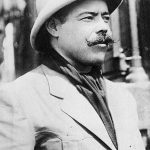Word Salad
By Sally Asante
And You Thought Learning Spanish was Tough!
For those of us who, in our later years, decided to leave our north-of-the-border homes for the sunny shores of Lake Chapala, learning Spanish was one of our top priorities. While some lucky few took to it like the proverbial duck to water, others, myself included, have found it as elusive as Big Foot. Oh, sure, I can make myself understood, as most of us can. But what I hoped would be a quick stop by Walmart or Farmacia Guadalajara can easily devolve into a lengthy game of hide and seek simply because my Spanish is insufficient to ask a clerk where I might find shoelaces, aluminum foil, baking soda, or pickle relish. Oh, the frustration.
I am a lover of language. I find it intriguing, fascinating, often amusing, and almost always logical. Wait. Logical? Or so I thought until recently when I received an e-mail from the well-known linguist and humorist Richard Lederer that made me ponder what learning English must be like for the non-native speaker. With his permission, I reproduce below a portion of Richard’s take on our mother tongue:
English is the most widely spoken language in the history of our planet, used in some way by at least one out of every seven human beings around the globe. Half of the world’s books are written in English, and the majority of international telephone calls are made in English. Sixty percent of the world’s radio programs are beamed in English, and more than 70 percent of international mail is written and addressed in English. Eighty percent of all computer texts, including all websites, are stored in English.
English has acquired the vastest vocabulary of all the world’s languages, perhaps as many as two million words, and has generated one of the noblest bodies of literature in the annals of the human race. Nonetheless, it is now time to face the fact that English is a crazy language—the most loopy and wiggy of all tongues.
In what other language do people drive in a parkway and park in a driveway?
In what other language do people play at a recital and recite at a play?
Why does night fall but never break and day break but never fall?
Why is it that when we transport something by car, it’s called a shipment, but when we transport something by ship, it’s called cargo?
Why does a man get a hernia and a woman a hysterectomy?
Why do we pack suits in a garment bag and garments in a suitcase?
Why do privates eat in the general mess and generals eat in the private mess?
Why do we call it newsprint when it contains no printing, but when we put print on it, we call it a newspaper?
Why are people who ride motorcycles called bikers and people who ride bikes called cyclists?
Why do we put cups in the dishwasher and dishes in the cupboard?
Why—in our crazy language—can your nose run and your feet smell?
Language is like the air we breathe. It’s invisible, inescapable, and indispensable, and we take it for granted. But when we take the time to step back and listen to the sounds that escape from the holes in people’s faces and to explore the paradoxes and vagaries of English, we find that hot dogs can be cold, darkrooms can be lit, homework can be done in school, nightmares can take place in broad daylight while morning sickness and daydreaming can take place at night, tomboys are girls and midwives can be men, hours—especially happy hours and rush hours—often last longer than sixty minutes, quicksand works very slowly, boxing rings are square, silverware and glasses can be made of plastic and tablecloths of paper, most telephones are dialed by being punched (or pushed?), and most bathrooms don’t have any baths in them. In fact, a dog can go to the bathroom under a tree—no bath, no room; it’s still going to the bathroom. And doesn’t it seem a little bizarre that we go to the bathroom in order to go to the bathroom?
Why is it that a woman can man a station but a man can’t woman one, that a man can father a movement but a woman can’t mother one, and that a king rules a kingdom but a queen doesn’t rule a queendom? How did all those Renaissance men reproduce when there don’t seem to have been any Renaissance women?
Sometimes you have to believe that all English speakers should be committed to an asylum for the verbally insane.
(Reprinted with permission.)
For more information about Lake Chapala visit: www.chapala.com
- April 2024 – Issue - March 31, 2024
- April 2024 – Articles - March 31, 2024
- April 2024 - March 31, 2024








